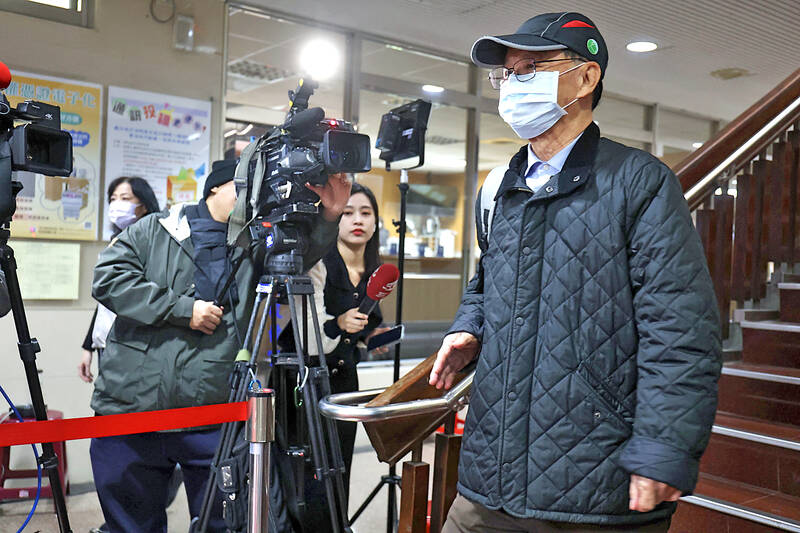The Taipei District Court yesterday opened its trial into a corruption case involving a Taipei development project during the tenure of then-Taipei mayor Ko Wen-je (柯文哲) and the use of political donations during Ko’s presidential campaign, with some defendants admitting guilt, while others maintained their innocence.
Former Taipei deputy mayor Pong Cheng-sheng (彭振聲) was the first defendant brought in, followed by former Taipei Urban Planning Commission executive secretary Shao Hsiu-pei (邵琇珮) and Ko’s presidential campaign finance manager, Lee Wen-tsung (李文宗).
Prosecutors last month indicted Ko on charges of corruption, embezzlement and breach of trust, alleging that he assisted Core Pacific Group (威京集團) and its subsidiary in gaining unlawful financial benefits of more than NT$12.105 billion (US$369.4 million).

Photo: CNA
Pong, Shao and Lee were among the 10 defendants alongside Ko indicted on breaches of the Anti-Corruption Act (貪污治罪條例), as well as embezzlement, bribery, forgery of documents and tampering with evidence.
Prosecutors also pressed charges against Ko, Lee and several other defendants for accounting fraud, embezzlement and personally profiting from political donations during last year’s presidential campaign in contravention of the Political Donations Act (政治獻金法) and other statutes.
Pong pled guilty, saying in his opening statement through his lawyer that he had “told investigators everything that I know, and admit to the charges against me. I will not retract these statements.”
His lawyer had some questions about the scope of the indictment and asked that the judges for more time to prepare for the defense, adding that Pong would not retract his testimony and had admitted to his involvement in the case.
Shao was quoted as already admitting to involvement, as her lawyers cited her cooperation and testimony during the investigation, and requested a reduced term and suspended sentence.
Prosecutors agreed with the statements by the defense and asked the court for more lenient terms for Pong and Shao, also citing that both had no prior criminal record, as well as provisions for defendants to receive reduced sentencing under the Witness Protection Act (證人保護法) for assisting prosecutors.
Meanwhile, Lee, who also served as director of the Taiwan Prestige and Solicitude Foundation, denied any wrongdoing.
Lee denied that the foundation and marketing firm Muko Public Relations (木可行銷公關), which was headed by his sister, Lee Wen-chuan (李文娟), were fronts for money laundering and illegal personal profiteering from political contributions by individuals and businesses for Ko’s presidential campaign.
The foundation was set up for Ko and the Taiwan People’s Party to promote their core values and party principles by engaging in charitable events, while the Muko Public Relations was a for-profit business, his defense said.
He received guidance from Ko, who told him that Muko would pay the wages of the campaign staff, and would manage the registration of health insurance and pension plans for them, Lee’s lawyers said.
Prosecutors have accused Lee of taking NT$2.1 million in bribes in the Core Pacific Mall redevelopment project, that he had misappropriated funds by using Ko’s image and likeness to sell campaign souvenirs, and had embezzled NT$8.27 million of donations to the foundation.

US President Donald Trump said "it’s up to" Chinese President Xi Jinping (習近平) what China does on Taiwan, but that he would be "very unhappy" with a change in the "status quo," the New York Times said in an interview published yesterday. Xi "considers it to be a part of China, and that’s up to him what he’s going to be doing," Trump told the newspaper on Wednesday. "But I’ve expressed to him that I would be very unhappy if he did that, and I don’t think he’ll do that," he added. "I hope he doesn’t do that." Trump made the comments in

NOT AN OPENING: Trump’s violation of international law does not affect China’s consideration in attacking Taiwan; Beijing lacks capability, not precedent, an official said Taiwanese officials see the US’ capture of the president of Venezuela as a powerful deterrent to Beijing’s aggression and a timely reminder of the US’ ability to defeat militaries equipped with Chinese-made weapons. The strikes that toppled Venezuelan President Nicolas Maduro signaled to authoritarian leaders, including Chinese President Xi Jinping (習近平), US President Donald Trump’s willingness to use military might for international affairs core to US interests, one senior official in Taipei’s security circle said. That reassured Taiwan, the person said. Taipei has also dismissed the idea that Trump’s apparent violation of international law could embolden Beijing, said the official, who was not

A cold surge advisory was today issued for 18 cities and counties across Taiwan, with temperatures of below 10°C forecast during the day and into tonight, the Central Weather Administration (CWA) said. New Taipei City, Taipei, Taoyuan and Hsinchu, Miaoli and Yilan counties are expected to experience sustained temperatures of 10°C or lower, the CWA said. Temperatures are likely to temporarily drop below 10°C in most other areas, except Taitung, Pingtung, Penghu and Lienchiang (Matsu) counties, CWA data showed. The cold weather is being caused by a strong continental cold air mass, combined with radiative cooling, a process in which heat escapes from

Snow this morning fell on Alishan for the first time in seven years, as a strong continental cold air mass sent temperatures plunging across Taiwan, the Central Weather Administration (CWA) said. The Alishan weather station, located at an elevation of about 2,200m in central Taiwan, recorded snowfall from 8:55am to 9:15am, when the temperature dropped to about 1°C, the CWA said. With increased moisture and low temperatures in the high-altitude Alishan area, the conditions were favorable for snow, CWA forecaster Tsai Yi-chi (蔡伊其) said. The last time snow fell at the Alishan weather station was on Jan. 10, 2018, while graupel fell there